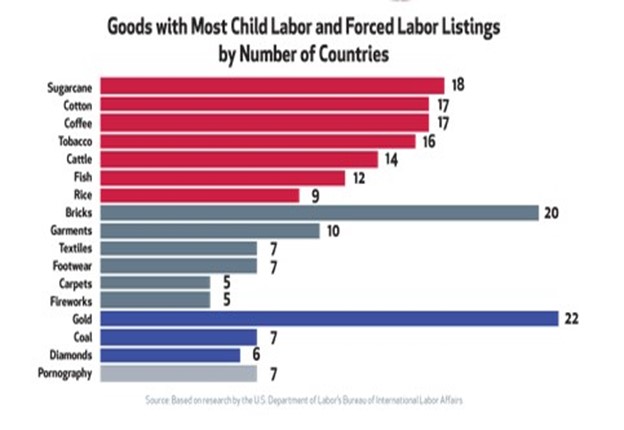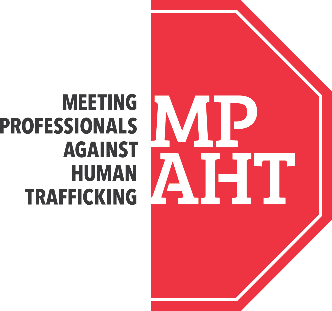Meeting Professionals Against Human Trafficking – Part 2
By Sandy Biback, CMP Emeritus, CMM, Founder Meeting Professionals Against Human Trafficking
May 2022
“If you see something
Say something
You could be wrong and that’s OK
Or you could be right and save a life”
Part 1 was about sex trafficking as it relates to the hospitality industry, but also to each person who decides that they want to be a part of the solution in the battle against human trafficking. Part two takes a closer look at supply chains in relation to human trafficking.
What is a Supply Chain?
A supply chain is a network between a company and its suppliers to produce and distribute a specific product to the final buyer … the supply chain also represents the steps it takes to get the product or service from its original state to the customer … retrieved from Google Definitions July 7, 2001.
In this article, I will be talking more specifically about Supply Chains, asking you to take a closer look at where the “coffee beans” are grown and how those picking the “coffee beans” are treated. And if you think human trafficking is only happening in other parts of the world, you are wrong. Think about the migrant workers for example in the Niagara area picking the grapes for the wine you are serving at your industry events. What are their living conditions? What if they get sick? How much are they paid? These are only a few of the potential issues. COVID has shed light on the plight of these migrant workers and governments and companies are now beginning to make changes.
There are many products and services used in the hospitality industry that have the potential to be related to human trafficking. The following graph from ILAB (Sweat & Toil) breaks down the goods with the most child labour and forced labour listings by the number of Countries.

Download ILAB (Sweat & Toil) App to explore what countries, what goods and what exploitation types happen for all the above. https://www.dol.gov/general/apps/ilab
Let’s look at these categories. How many relate to the hospitality business? 10? 11? Take cotton as an example. In a hotel, restaurant, convention centre, where do you see cotton being used?
I read somewhere that if you paid a living wage to those that assemble t-shirts, the price of that same t-shirt would go up by $1.
Using this type of example, let’s consider a product that many planners use in meetings and events – coffee. The supply chain for that urn of coffee would look something like this: worker who picks the beans -> hotel who purchases the beans -> planner who purchases an urn of coffee for their meeting. If the person picking the coffee beans at the beginning of this supply chain makes a living wage for that country and has suitable living accommodations, how much more will that urn of coffee cost? $10? If that urn of coffee serves 20 people, that’s 50 cents a cup!
And what about making sure that housekeepers at your property are not part of a human slavery ring? With so much outsourcing, this is not a ‘something over there’; it is happening ‘over here’.
What can you, as a planner or supplier do? I know it seems insurmountable and quite frankly it is, but we all have to start somewhere. Here are some concrete actions you can take:
- Check out https://themekongclub.org/ for a multitude of free tools. There is a free self-assessment to get you started.
- Hoteliers, Restauranteurs, and other Suppliers – explore just ONE of your supply chains—see how far you can dig down and what you find out.
- Hoteliers, Restaurateurs, other Suppliers – add a sentence or two on your marketing materials to clearly state that you explore and look for supply chains that discourage human slavery
- Planners – ask questions relating to human trafficking and supply chains on your RFP’s
- Whatever your role – add a sentence or two that illustrates that your company/association believes in managing supply chains to help prevent human slavery.
About Meeting Professionals Against Human Trafficking (MPAHT)
Meeting Professionals Against Human Trafficking (MPAHT), a Toronto-based organization formed by event industry professionals, creates awareness and dispels the myths surrounding human trafficking in Canada. With collaboration and education, MPAHT is driving the conversation in the meetings and conference industry at large on human trafficking that may be taking place at events and through our allied partners including hotels and airlines. Together we can help stop human trafficking in our industry.
Find us at www.mpaht.com ; on Facebook, LinkedIn, Twitter and Instagram
Sandy Biback, CMP Emeritus, CMM, Founder Meeting Professionals Against Human Trafficking, has over 40 years as a conference planner, hospitality professor and industry volunteer. For more information, contact Sandy at [email protected]

